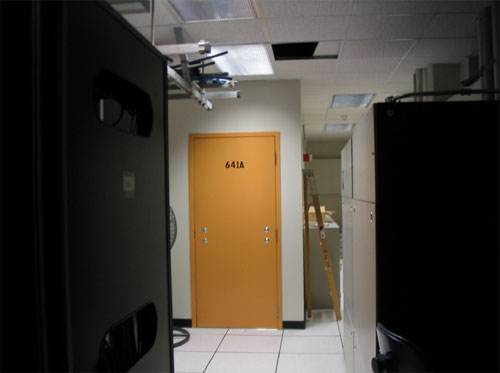Federal appeals court rejects government bid
to dismiss warrantless surveillance lawsuit

Photo courtesy University
Press
By Julia Cheever
November 16, 2007
A federal appeals court in San Francisco today kept alive a
lawsuit filed against President Bush by a now-defunct Islamic
charity in Oregon for alleged warrantless interception of its
phone calls.
The 9th U.S. Circuit Court of Appeals rejected the government's
argument that the lawsuit should be dismissed on the ground that
any challenge to national security surveillance would endanger
state secrets.
A three-judge panel court said that since late 2005, Bush and
other officials have provided "a cascade of acknowledgements
and information" about the Terrorist Surveillance Program,
although the information may have been selective.
The court said the government therefore can't argue the lawsuit
should automatically be dismissed.
Circuit Judge Margaret McKeown wrote, "The state secrets
privilege does not bar the very subject matter of this action."
The panel said the Al-Haramain Islamic Foundation and two of
its lawyers could pursue a claim that the alleged surveillance
conflicted with provisions of the U.S. Foreign Intelligence Surveillance
Act.
The court sent the case back to U.S. District Judge Vaughn Walker
in San Francisco for further proceedings.
Walker has been assigned to handle about 45 domestic surveillance
lawsuits originally filed in a number of courts around the country.
Unlike the Al-Haramain lawsuit, most of the others were filed
not against the government but against telecommunications companies
for allegedly aiding the National Security Agency in warrantless
spying.
At the same time, the panel said Al-Haramain and its attorneys
couldn't use a key piece of evidence because that evidence was
specifically a state secret related to national security.
The evidence, identified in the ruling only as the Sealed Document,
is a top-secret log of intercepted phone calls that was accidentally
given by government officials to the plaintiffs' lawyers in 2004.
After the disclosure was discovered, the FBI retrieved all copies
of the document. But a federal judge in Oregon who was originally
assigned to the case allowed the charity's attorneys to file confidential
statements about their memories of the material.
McKeown wrote that all three judges on the appeals panel had
looked at the document and agreed it should be kept secret. The
panel said the attorneys couldn't present evidence about their
memories of it because that would be a "back door" way
around the state secrets doctrine.
As a result, the court said, the only remaining ground for the
lawsuit is the claim that the alleged surveillance violated the
FISA program for protecting national security and that the FISA
law preempts the government's state secrets privilege.
The charity's lawyer, Jon Eisenberg of Oakland, said that part
of the lawsuit is "alive and well."
"We intend to go back to Judge Walker's court and pursue
that argument vigorously," Eisenberg said.
Justice Department spokesman Charles Miller said, "We are
pleased with the court's decision."
Miller, referring to the court's conclusion on the secret document,
said, "The 9th Circuit upheld the government's position that
the release of this information would undermine the government's
intelligence operations and compromise national security."
Meanwhile, the appeals court has not yet ruled on another key
case that was argued on the same day as the Al-Haramain case in
August.
In the other case, Tash Hepting of San Jose and three other Californians
are suing AT&T Corp. for allegedly giving the National Security
Agency telephone and Internet records of millions of Americans
without a court warrant.
The government claims that case also implicates state secrets
and is appealing Walker's refusal to dismiss the lawsuit. The
court's eventual ruling is expected to determine whether any of
the suits against telecommunications companies can proceed.
Cindy Cohn, legal director of the San Francisco-based Electronic
Frontier Foundation, said she was cautiously optimistic that today's
ruling means the appeals court will not dismiss the Hepting case.
"I'm very hopeful the court will find that the Hepting lawsuit
is not covered by the blanket state secrets doctrine," she
said. The foundation represents the plaintiffs in that lawsuit.
But Cohn said the circumstances of the two cases are different
and the evidence is different as well. In the Hepting case, the
evidence includes statements by former AT&T technician Mark
Klein alleging that a fiber optic cable in San Francisco was used
to send copies of customers' e-mails and Internet phone calls
and traffic to the NSA.
Cohn said the government has conceded that evidence is not a
protected state secret.
The Hepting lawsuit claims the alleged surveillance violated
federal communications privacy laws, the Constitution and the
FISA law.
American Civil Liberties Union attorney Ann Brick, who represents
citizens suing Verizon Communications Inc., said, "The Bush
administration's ever-increasing use of the state secrets privilege
to thwart holding it accountable for its illegal conduct remains
deeply troubling."
Brick contended the administration has used the same argument
to seek to avoid judicial scrutiny of alleged torture and rendition
programs.
She said, "The courts have an important role to play in
all of these cases and it is very significant that the 9th Circuit
sent the Al-Haramain case back to the district court for a determination
of whether FISA trumps the state secrets privilege."

Photo courtesy Wired.com
Permalink
Copyright © 2007 by Bay City News, Inc. -- Republication,
Rebroadcast or any other Reuse without the express written consent
of Bay City News, Inc. is prohibited.
####
|